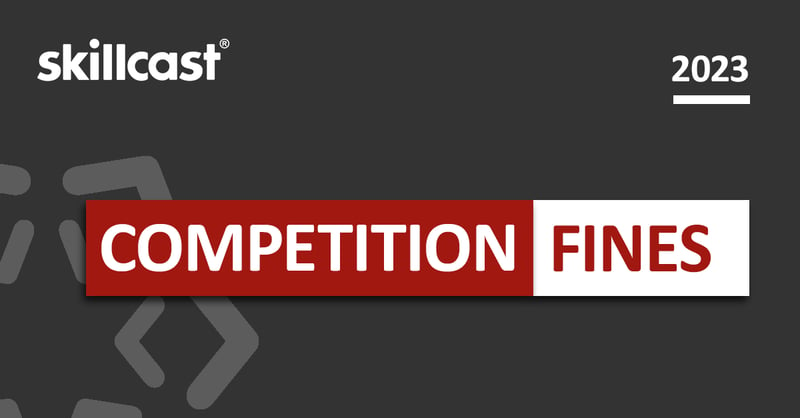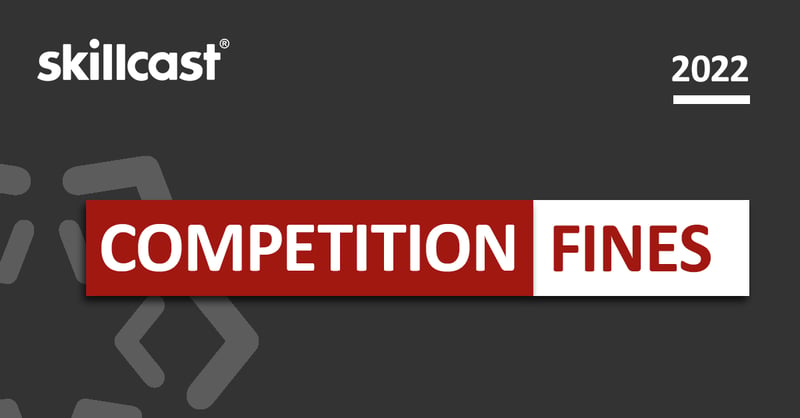Business owners should understand how best to comply with UK competition law when negotiating contracts. Competition law is there to protect both businesses and consumers. The Competition and Markets Authority (CMA) can take legal action against companies and individuals if UK competition law isn't complied with.
Preventing anti-competitive practices
- What is anti-competitive behaviour?
- How to stay compliant with competition law?
- What is price-fixing?
- What are the rules on price-fixing in the UK?
- What are the penalties for price-fixing?
- What are notable price-fixing fines?
If the CMA investigates, it could result in a large company fine and personal consequences for the company directors, including disqualification as a company director under The Company Directors Disqualification Act 1986.
According to the CMA, 10 company directors were disqualified because of competition law breaches.
''The risks of getting caught breaking competition law is increasing. The CMA is toughening its approach to enforcement, with fines on companies accompanied by increased use of powers to obtain the disqualification of directors of the companies involved.''
What is anti-competitive behaviour?
Anti-competitive behaviour refers to actions taken by firms to manipulate markets, stifle competition, or gain an unfair advantage over rivals, often to the detriment of consumers and the broader economy. The following list outlines anti-competitive practices.- Collusion: When competitors within an industry conspire to fix prices, manipulate bids, or divide territories to reduce competition.
- Exclusive dealing: This occurs when a company imposes restrictions on customers or suppliers that prevent them from dealing with competitors.
- Predatory pricing: When a company deliberately lowers prices to drive competitors out of the market, intending to raise prices once competition is eliminated.
- Tying and bundling: This is when a company requires customers to purchase one product in order to get another product, often to stifle competition.
- Price discrimination: When a company charges different prices to different customers for the same product or service without justification.
- Misuse of intellectual property: When a company uses its intellectual property rights (such as patents, trademarks, or copyrights) to stifle competition rather than to protect innovation.
- Non-compete agreements: While these agreements are sometimes necessary to protect legitimate business interests, they can also be used unfairly to restrict employees' ability to seek employment with competitors after leaving a company.
- Monopolisation: When a company gains excessive control over a particular market or industry, leading to decreased competition and potential harm to consumers.
To help, here are six tips to reduce the risks of your business falling foul of competition behaviours.
How to stay compliant with competition law?
1. Avoid conversations on pricing, strategy & customers
Discussing with a rival firm about pricing before negotiating a new contract with a third party can seem like good business planning until you understand the risks of breaching competition law and the consequences.
Businesses could be fined just by chatting about prices and forming a cartel or breaking other areas of competition law. If your business trades internationally, then your worldwide turnover figure is used to calculate the maximum fine.
In addition, company directors can be disqualified from being a company director for up to 15 years, and in cases of cartel activity, individuals could face criminal prosecution. In serious cases, this could result in imprisonment for up to 5 years and/or a fine and the confiscation of assets under The Proceeds of Crime Act 2002.
If you happen to be at an event where any of your competitors are present, it's always safest to avoid talking business with rivals.
2. Lookout for anti-competitive practices
It is no defence for a company director or a salesperson to say that they did not know what they were doing was wrong and contrary to UK competition law.
Few people in business are competition law experts, and it is easy to get sucked into what starts as a friendly local trade association and ends up as a price-fixing cartel, with all the financial and reputational damage consequences for the companies and individuals involved.
Keep an eye out for any anti-competitive behaviour in the workplace and flag or report it to the relevant people within your organisation.
3. Size doesn't matter
Competition rules apply to small and big businesses. It doesn't matter if you don't trade overseas or contract to secure internationally sourced goods.
If you break the law, firms can be fined up to 10% of global turnover, and individuals may be banned or face imprisonment for up to 5 years.
4. Anti-competitive behaviour isn't just price fixing
When you think of the risks involved in falling foul of competition law, most people think of cartels. However, under Chapter II of the Competition Act 1998, you can also breach competition law if you abuse a dominant position in the marketplace. A dominant position can arise if you have over 40% of the market share.
5. Put anti-competition law training in place
Whether you are a company director, head of sales or procurement or a department head, you must know enough about competition law to know when something is wrong.
That way, the business can be alerted and hopefully act to quash any potentially anti-competitive practices thought to be money-making ideas by over-enthusiastic company directors or employees.
It also pays to remember that anti-competition training should not be a one-off. Risk management training should regularly be reviewed and updated so you keep abreast of developments in competition law. That's because business reputations are hard-won but can be easily lost if the company is not committed to complying with competition laws.
6. If you make a mistake, come clean
You may receive leniency and avoid sanctions if you speak up first.
Report any concerns you have to the CMA:
- Email: cartelshotline@cma.gov.uk or;
- Phone: 0800 085 1664 or 020 3738 6888.
What is price-fixing?
Only 51% of companies in the UK knew price-fixing was illegal when surveyed in 2021. The bigger concern was that awareness had only improved by 6% since the previous survey in 2018.
So, what are the consequences of breaching UK price-fixing legislation? And most importantly, how can you avoid price-fixing and other anti-competitive practices?
What are the rules on price-fixing in the UK?
Businesses and their owners, managers, and employees must not discuss the prices they will charge their customers with their competitors in the UK.
A company would be breaking the law if they agreed with another business:
- to charge the same prices to customers
- to offer discounts or increase prices at the same time
- to charge the same fees to intermediaries, e.g. retailers selling products on the company's behalf
What are the penalties for price-fixing?
The issue is that price-fixing leads to over-inflated prices and unfair treatment of consumers. It creates an unfair environment for customers, who pay more for lower-quality goods and services.
If found guilty of price-fixing, a company can face a fine of up to 10% of the worldwide turnover of the undertaking. Individuals can also receive personal files, director disqualification, or jail time.
What are notable price-fixing fines?
The cases below show just how significant the financial penalty can be.
Trod Ltd - price-fixing - £163k fine
Trod admitted to agreeing with its online competitor, GB Posters, not to undercut prices for posters and frames sold on the Amazon marketplace. The two companies sold a range of sports and entertainment-branded merchandise between 2001 and 2015 and fixed prices using automated software. GB escaped fines after reporting the cartel to the CMA.
Ultra Finishing - Retail Price Maintenance - £826k fine
Bathroom supplier Ultra Finishing Ltd was fined a whopping £826,000 by the CMA after admitting Resale Price Maintenance (RPM) between 2012 and 2014. Ultra threatened retailers with penalties if they sold products below the RRP, including ceasing supply, withdrawing their rights to use their images online, and charging them more for products.
Spire Healthcare Ltd - £1.2m fine
Spire was fined for instigating and facilitating a price-fixing agreement. A Spire employee suggested that consultant ophthalmologists fix their fees for self-paying patients. The employee justified this suggestion, saying that this simplifies the prices to make them less confusing for patients. One consultant ophthalmologist did not agree to this and raised competition concerns.
Construction firms - £59.3m fine
The CMA fined 10 construction companies in the UK nearly £60m in total for colluding on prices through illegal cartel agreements and rigging bids relating to 19 contracts worth £150m. Each of the firms fined was involved in at least one of the bids that were rigged.

Want to learn more about competition compliance?
We have created a series of comprehensive roadmaps to help you navigate the compliance landscape, supported by several financial crime prevention courses in our Essentials Library.
We also have 100+ free compliance training aids, including assessments, best practice guides, checklists, desk aids, eBooks, games, posters, training presentations and even e-learning modules!
Finally, the SkillcastConnect community provides a unique opportunity to network with other compliance professionals in a vendor-free environment, priority access to our free online learning portal and other exclusive benefits.







